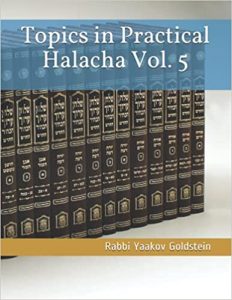
*As an Amazon Associate I earn from qualifying purchases.
Inducing labor:[1]
In general, the opinion of the Gedolei Haposkim, including the Rebbe[2], is that one should not induce labor unless there are mitigating circumstances requiring or encouraging it to be done.[3] However, if there is no pressing medical reasons, then it should be avoided and she should give birth at the time that G-d has deemed right. This restriction applies especially if doing so will cause Shabbos desecration.[4]
Example of mitigating cases:[5] Some mitigating reasons may include: Needing a specific midwife or doctor for a complicated birth who will not be around at a later date; lack of available Dr. at a later time; she is already in her 10th month and the doctors medical opinion is that the birth should take place now. Certainly, it may be done if continuing the pregnancy can be deemed dangerous for the mother or fetus.
Inducing labor through natural methods [i.e. massage, walking, intimacy]:[6] It is permitted to induce labor using natural ways, such as through having intimacy, or massaging certain parts of the body [i.e. nipple stimulation], or through walking up and down stairs or walking a long distance. However, one is not to do so close to, or on Shabbos, in order to avoid giving birth on Shabbos and causing unnecessary Shabbos desecration.
Speeding up the labor once the labor has already begun: Once the woman has entered into active labor, it is permitted to perform actions or take medication in order to speed up the labor process. This may certainly be performed once she enters the stage of labor for which one may desecrate Shabbos on her behalf, and may do so even on Shabbos itself.
Stripping:[7] Stripping should not be done in order to induce labor, especially if doing so can cause the birth to take place on Shabbos, unless there are mitigating circumstances, or she is already in the middle of labor, as stated above.
Amniotomy-Breaking the waters: Breaking the waters [i.e. amniotomy] should not be done in order to induce labor, especially if doing so can cause the birth to take place on Shabbos, unless there are mitigating circumstances, or she is already in the middle of labor, as stated above.
_____________________________________________________________[1] See Rokeiach on Koheles 3:11 “God does everything in the proper time… Accordingly one should not induce labor for a woman to give birth early thus the child be borne by a bad Mazal”; Hakdamas Ravaad on Sefer Yetzira “birth is in the hands of God as He is the one who releases the pangs of birth. You must know that at the moment that a woman sits to give birth down here below that is when the soul above becomes complete. From there the child will receive all of his future tidings. Accordingly, you must know that those who write amulets to help induce labor early at times are killing two souls, and at times cause for the child to have bad occurrences and suffering to occur during his lifetime and God will avenge his blood”; Hakdamas Kesav Sofer on Torah; Igros Moshe 2 Y.D. 74; Taharas Habayis 2:54; Mishneh Halachos 9:184; Shevet Halevi Y.D. 6:128; Toras Hayoledes Chapter 1; Nitei Gavriel Nidda 3 62:8 and 11; Nitei Gavriel Nidda 2 106:21; Nishmas Avraham Y.D. 194:13; Igros Kodesh 28:46; Kefar Chabad Volume 733; Shulchan Menachem 6:8 [p. 33]; Encyclopedia Hilchatit Refuit Leida p. 271; See Hakdamas Haraavad on Sefer Yetzira p. 8
[2] Igros Kodesh 28:46 “It is understood that it is proper to finish the days of the pregnancy and not to induce labor prior to its time.” Kefar Chabad Volume 733 “why mix into the timetable that God has set for the child to be born. It is better for the birth to be natural and for the child to be born at the right time.”
[3] The reason: As even if birth will not take place on Shabbos as a result of the induction, one should not change the timetable that God has for the child to be born, as doing so can affect the child both physically and spiritually. [See Rokeiach ibid; Raavad ibid]
[4] See Toras Hayoledes 1:2; Nitei Gavriel 61:14
[5] Toras Hayoledes 1:3; Encyclopedia Hilchatit Refuit ibid
[6] Toras Hayoledes 1 footnote 5
[7] Toras Hayoledes 1:4


Leave A Comment?
You must be logged in to post a comment.